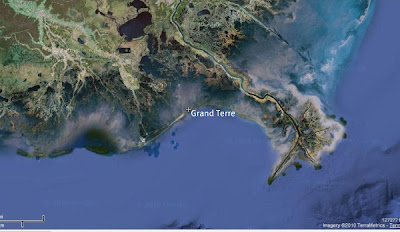A bird is mired in oil on the beach
at East Grand Terre Island along the
Louisiana coast on Thursday, June 3, 2010.
(AP Photo/Charlie Riedel)
at East Grand Terre Island along the
Louisiana coast on Thursday, June 3, 2010.
(AP Photo/Charlie Riedel)
The Cajun and his dad and brother went shrimping in our Mississippi Sound a few days ago, a result of the Department of Marine Resources opening the shrimp season early. They hoped to give the shrimpers an opportunity to catch some shrimp before any form of oil threatened the Sound, but warned that it could be a very short notice closing.
The Mississippi Sound is located between our barrier islands in the Gulf of Mexico and the coastline of Mississippi. If you've ever been to our beaches, you'll notice that our water is not crystal clear and blue like it is in Florida - those barrier islands are the reason. The Cajun said the water was clean though and there were plenty of shrimp, though somewhat on the smaller side than normal. Somehow, whatever oil has made it's way over from the damaged rig has drifted more west toward southern Louisiana and more east of us, toward Alabama's Dauphin Island and the Florida panhandle. For now.
They hauled in about 700 pounds or so on our small, family owned, wooden shrimp boat. My father in law has a "day job" so he shrimps for pleasure, not for business, and thanks to his boys helping out in prepping the boat each year, we all get to fill all of our freezers with shrimp at each season opening. I was standing in the kitchen rinsing, sorting and heading about 100 pounds of shrimp to put up in freezer bags, when that image above came on the television. I don't mind telling you that I literally broke down right there at the sink.
A Brown Pelican is seen on the beach
at East Grand Terre Island along the Louisiana coast
on Thursday, June 3, 2010. (AP Photo/Charlie Riedel)
The birds, including many Brown Pelicans - Louisiana's state bird - were found happenstance, when Governor Bobby Jindal was touring the area to survey a dredging operation, intended to help with the current oil problems, and something that he had been begging the government to take action on well before this tragedy at Grand Terre.
These poor babies. They don't deserve this. The reporter on television noted that when these birds were found - and there were many of them - they were rescued and taken to be cleaned, examined and treated. Some may survive. Some, like the fella there at the top, I don't know how. But how many more have suffered painful deaths that we don't even know about? It literally tears my heart apart.
Grand Terre is located in southeast Louisiana between Barataria Bay and the Gulf of Mexico, south of New Orleans. The Mississippi Gulf Coast is less than 100 miles east of New Orleans. Like our barrier islands, Grand Terre, right at the mouth of Barataria Bay, provides critical protection to the inner marshes to the north and provides critical habitat for estuarine dependent fish and invertebrate species. Already facing major erosion challenges due to hurricanes of years past, the Grand Terre area was in the midst of a major restoration project before this spill. This project was intended to stabilize and benefit 1,575 acres of barrier island marsh habitat and extend the island's life expectancy.
Grand Terre Island provides a favorable habitat for many migratory and nesting birds, including tanagers, pelicans and buntings. The Brown Pelican - of which several were found mired in the thick oil at Grand Terre - was only just removed from the endangered species list in 2009.
Grand Isle State Park, located on the far east end of the island, is the only state owned and operated beach on the Louisiana Gulf Coast.

May God forgive and help us.

Want that oil spill counter in the upper right hand corner for your own website? Hover over it and click in the white box to get the imbed code. Then just paste it into your sidebar.
Sources: Louisiana.gov Gulfbase.org Baton Rouge Advocate Online
~




Mary,
ReplyDeleteHeartbreaking..I couldn't bear to look at the poor thing. You are right..may God forgive us. Some folks got lots of splainin to do at the Pearly Gates.
We almost couldn't stand to watch the news last night with the heart breaking pictures of the birds.
ReplyDeleteWe can see their suffering and save as many as possible. We can't save the sealife which is surely doing as badly.
It's so horrible and I don't think we know how bad the end result will be.
Yeah well I've practically gotten into fist fights with people when I used to live in Louisiana, because I am totally against the drilling in the Gulf. I have a lot of words, but they are cuss words and angry words, and I'd like someone to explain to me why some foreign company was drilling in our Gulf anyway. And now they are throwing money around in Washington to hush everyone up.
ReplyDeleteDEAR MARY,
ReplyDeleteTHERE ARE NO WORDS TO DESCRIBE THIS DEVASTATION. I HAVE PRAYED ABOUT THIS SINCE DAY ONE.
EVERYTIME THEY SHOW THE BROWN PELICAN BARELY BREATHING AND HIS EYES, MOUTH, AND HEAD COVERED IN OIL, IT JUST MAKES ME CRY.
THERE HAVE BEEN REPORTS OF DOLPHINS DYING AND WHO KNOWS WHAT IS BEING KILLED UNDER THE SEA.
WONDERFUL, INFORMATIVE POST.
ANGEL HUGS
SIMPLY DEBBIE